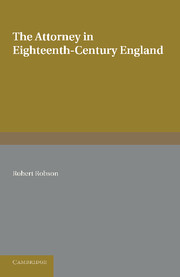Book contents
- Frontmatter
- Dedication
- Contents
- General Editor's Preface
- Preface
- Chapter I Attorneys and Solicitors Before 1700
- Chapter II Regulation of the Profession
- Chapter III The Society of Gentlemen Practisers
- Chapter IV The Provincial Law Societies
- Chapter V The Making of an Attorney
- Chapter VI The Attorney in Local Society
- Chapter VII Estates and Elections
- Chapter VIII Administration and Finance
- Chapter IX Two Attorneys
- Chapter X The Road to Respectability
- Appendix I The Apprenticeships of Richard Carre and Samuel Berridge
- Appendix II The Admission of an Attorney
- Appendix III Christopher Wallis: Notes from the Journal
- Appendix IV A Note on Numbers
- Appendix V The Professions in the Eighteenth Century: a Bibliographical Note
- List of Primary Sources
- Index
Chapter I - Attorneys and Solicitors Before 1700
Published online by Cambridge University Press: 05 June 2016
- Frontmatter
- Dedication
- Contents
- General Editor's Preface
- Preface
- Chapter I Attorneys and Solicitors Before 1700
- Chapter II Regulation of the Profession
- Chapter III The Society of Gentlemen Practisers
- Chapter IV The Provincial Law Societies
- Chapter V The Making of an Attorney
- Chapter VI The Attorney in Local Society
- Chapter VII Estates and Elections
- Chapter VIII Administration and Finance
- Chapter IX Two Attorneys
- Chapter X The Road to Respectability
- Appendix I The Apprenticeships of Richard Carre and Samuel Berridge
- Appendix II The Admission of an Attorney
- Appendix III Christopher Wallis: Notes from the Journal
- Appendix IV A Note on Numbers
- Appendix V The Professions in the Eighteenth Century: a Bibliographical Note
- List of Primary Sources
- Index
Summary
THE present division of the legal profession into barristers and solicitors existed in the eighteenth century, and the division of labour in its present form had in many respects already been established. Indeed, as far as the essential difference between the two branches of the profession was concerned, the distinction between those who were permitted to plead a client's cause before the judges, and those who could only conduct it up to this stage, it may be said to have existed in the sixteenth century. This distinction was marked by a difference in the organisation and regulation of the two branches, and was itself the product of the theory and practice of the law in medieval England.
The idea that a man could stand in place of another in legal disputes, that he could be his attorney, was alien to early conceptions of the law, and was perhaps inappropriate to the simpler structure of society. To appear in court by attorney was at first a privilege restricted to the king, for whom such a representation was an obvious necessity. Gradually the privilege was extended to others, but it survived surprisingly long as a privilege, and was not readily conceded as a right to be demanded by all litigants. Eventually, however, the concession which the king at first allowed to favoured subjects was made to all who sought it. The growing complexity of society and of its laws involved more and more people in litigation, and in litigation so abstruse as to demand the technical assistance of those skilled in the law. It was in response to this need that the legal profession arose, and naturally enough, attorneys came to be chosen from those who, by habitual attendance on the courts, had acquired a special knowledge of their practices.
But if the appointment of an attorney was at first rare because it conflicted with early notions of the law, the assistance of a pleader was commonly allowed and was entirely in harmony with these ideas. The pleader or barrister did not stand in his client's place, but only used his skilled voice on his behalf, and this was not a function which had to be conceded as a privilege by the king or his judges.
- Type
- Chapter
- Information
- The Attorney in Eighteenth-Century England , pp. 1 - 6Publisher: Cambridge University PressPrint publication year: 2013



